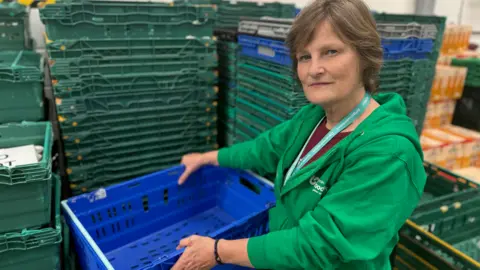In recent reports, the Lincoln Foodbank has made headlines due to a critical shortage in stock, prompting an urgent appeal for donations. As management indicated, the food bank is currently at a breaking point, struggling to meet the rising needs of the local community amidst falling donations. This situation resonates across numerous food banks, posing significant challenges as they endeavor to support families facing hunger and food insecurity.
Lincoln Foodbank operates under the umbrella of the charity Acts Trust in collaboration with The Trussell Trust. The management has expressed deep concern about its dwindling supplies, with services manager Carolyn Bradbury stating, “The situation is dire. We’ve got about two weeks’ worth of food left in the warehouse if no further food comes in. We’ve never had it this empty before.” This stark commentary underscores the gravity of the crisis and the direct impact it has on vulnerable individuals and families relying on these essential services.
The food bank reports a troubling pattern: the need for food parcels continues to surge while donations have dropped significantly since January. Each week, Lincoln Foodbank distributes between 150 and 160 parcels, each containing a minimum of three days’ worth of meals for various household sizes. However, reduced food supply means it is increasingly difficult to maintain these distributions, raising alarms about potential solutions in the face of this crisis.
Bradbury articulated the unfortunate measures that the organization has begun to take, revealing, “We are at a point now of having to go out and buy food.” Historically, the food bank relied on the generosity of community donations, and this shift marks a concerning trend that emphasizes the need for enhanced support. She further implored residents to donate whatever they are able: “The best way to help is just to give. Give what you can. It doesn’t matter how small it is, just put it in a donation tub, and we’ll get it out there.”
Lincoln Foodbank has also embraced technology as a means to assist in tracking donation needs; they encourage potential contributors to utilize the BanktheFood app, which lists precise items in demand. In addition, a network of donation points exists across multiple supermarkets in Lincoln where residents can drop off dry goods, expanding opportunities for support.
The Trussell Trust, as a supportive backbone for a network of food banks, has reported similar trends on a national scale. A spokesperson acknowledged, “Food banks in the Trussell community across the UK are facing challenging times, with some at breaking point, as they seek to continue to serve their communities.” They highlighted the gratitude for public generosity but noted that due to ramping costs, the donations no longer stretch as extensively as before.
For anyone needing assistance, the Trussell Trust encourages residents to reach out to their local food bank, providing essential resources for those who may be unaware of how to access food aid.
As this situation develops, it illustrates not only a local crisis in Lincoln but also a broader issue of food insecurity faced across the UK. The discourse surrounding food banks is essential, revealing both the struggles of the organizations and the necessity for community involvement. With the continuing rise in living costs and economic strains on households, the urgency of maintaining nourishment for those in need calls for collective efforts, whether through donations of food or funds, aiming for sustained support for individuals experiencing hardships.
In a call-to-action, communities are reminded of the power of collective involvement. Even small contributions can have a far-reaching impact, potentially providing hope and sustenance to neighbors in distress.



